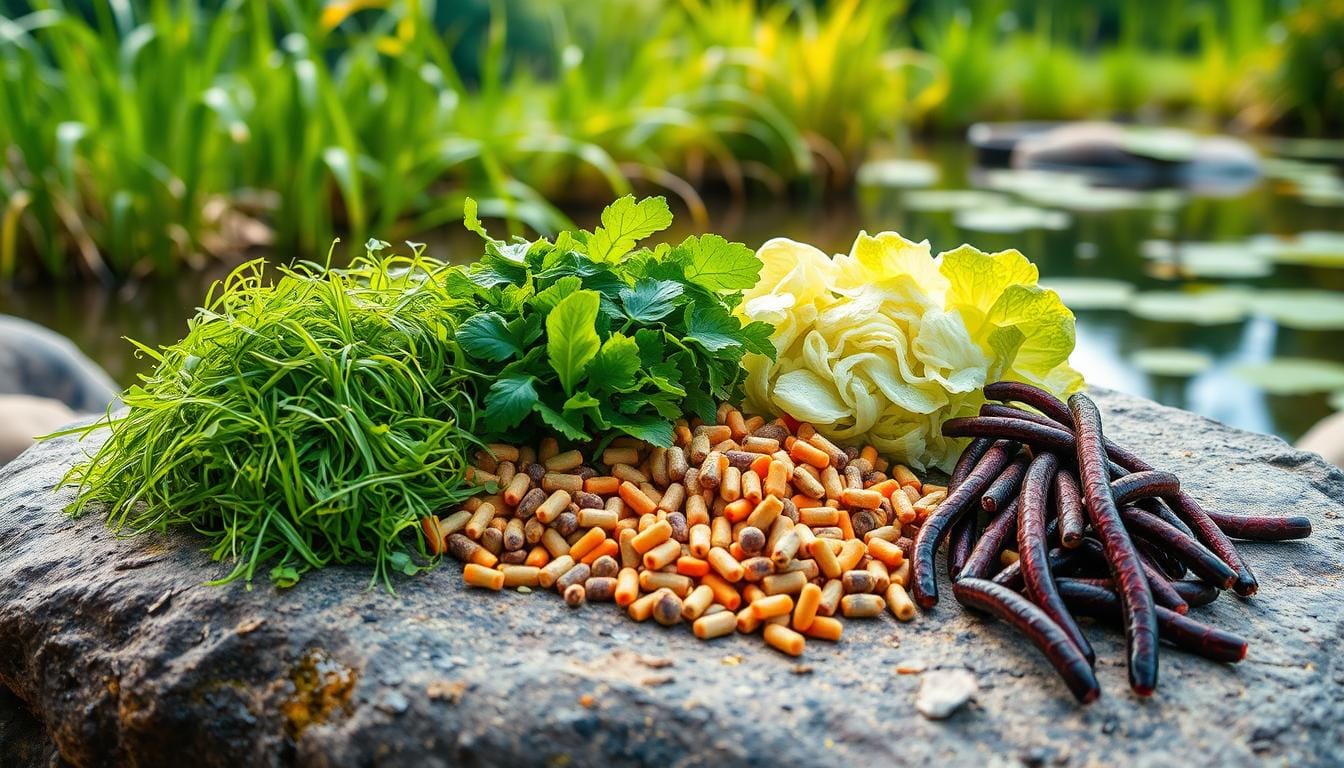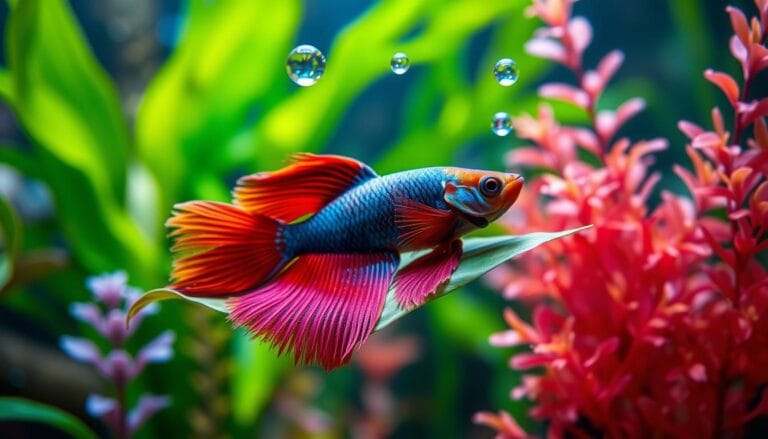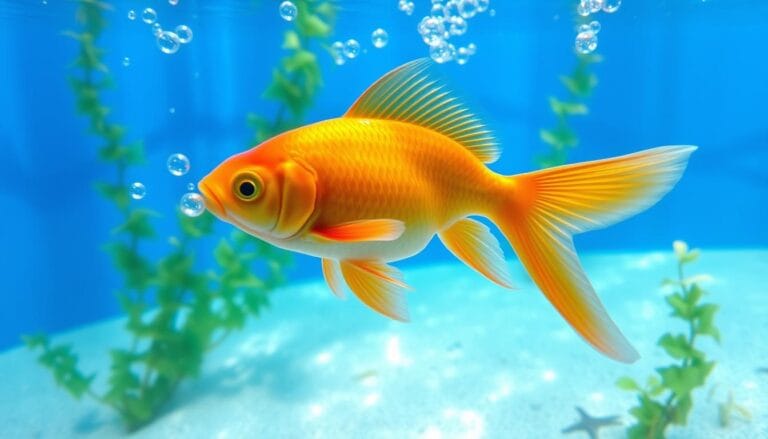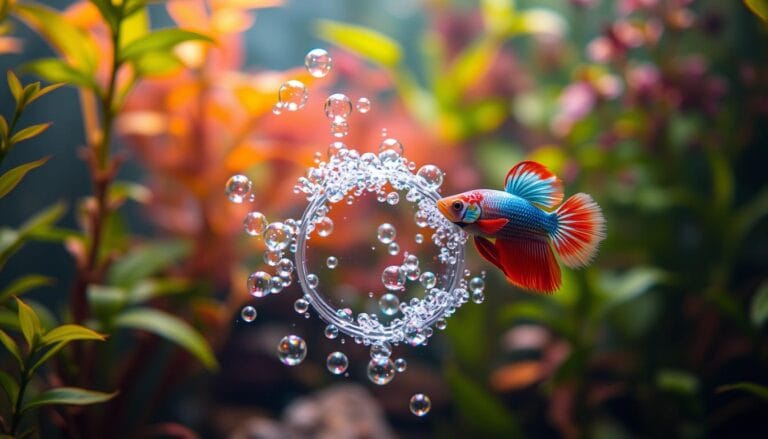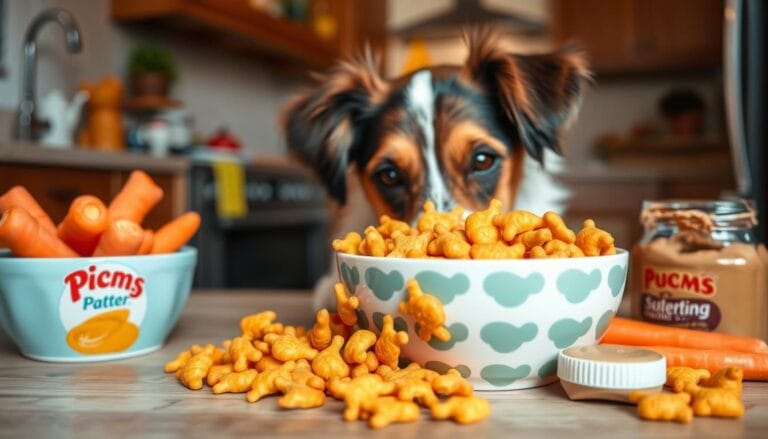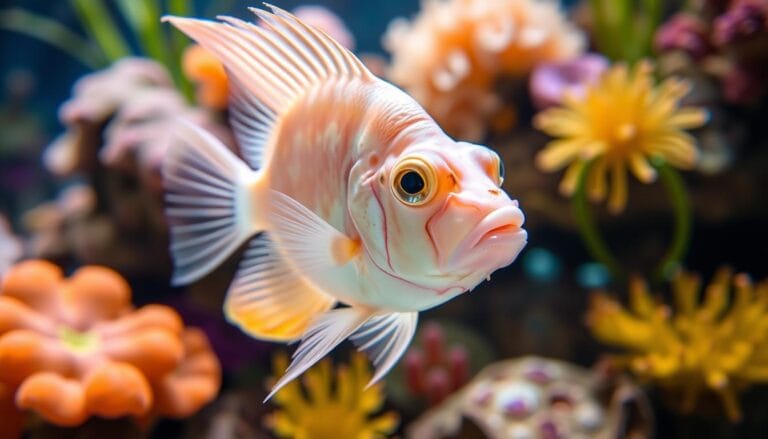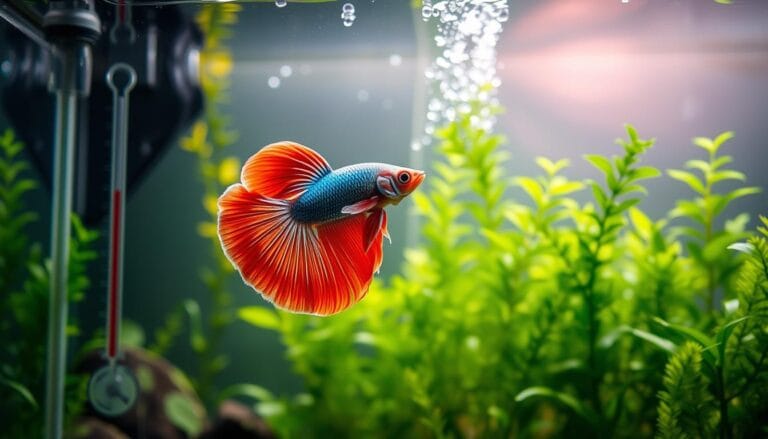What Do Koi Fish Eat? Best Foods for Healthy Koi
We often wonder what do koi fish eat, and the answer is quite simple: a balanced diet. As koi fish owners, we want to provide our pets with the best food for koi to ensure they stay healthy and thrive. But have you ever stopped to think about the importance of a balanced diet for your koi fish? A well-planned feeding schedule can make all the difference in their overall health and well-being. When we ask ourselves what do koi fish eat, we should also consider the consequences of overfeeding and the benefits of a nutritious diet.
Table of Contents
As we explore koi fish nutrition, we’ll look at the best foods for koi and how to create a feeding schedule that meets their unique needs. We’ll cover understanding their dietary requirements and avoiding common feeding mistakes. So, let’s dive in and discover the secrets to keeping our koi fish happy and healthy.
Key Takeaways
- Koi fish require a balanced diet that includes a variety of foods, including what do koi fish eat and food for koi.
- A well-planned feeding schedule can help prevent overfeeding and ensure optimal health.
- Understanding koi fish dietary needs is key for providing the best food for koi.
- Feeding frequency and portion control are essential for maintaining a healthy koi population.
- Avoiding common feeding mistakes can help prevent health problems and improve water quality.
- Providing a balanced diet that includes what do koi fish eat and food for koi can help reduce stress and improve immune systems.
- Monitoring koi health through diet is essential for ensuring their overall well-being.
Understanding Koi Fish Dietary Needs
Koi fish eat a variety of foods like insects, algae, and small plants. They need a diet rich in protein, vitamins, and minerals. How often you feed them depends on the water temperature.
Feeding too much can pollute the pond and harm the fish. Feed them 1 – 4% of their body weight. Each meal should last about 5 minutes, and they should eat all food in 3 – 5 minutes.
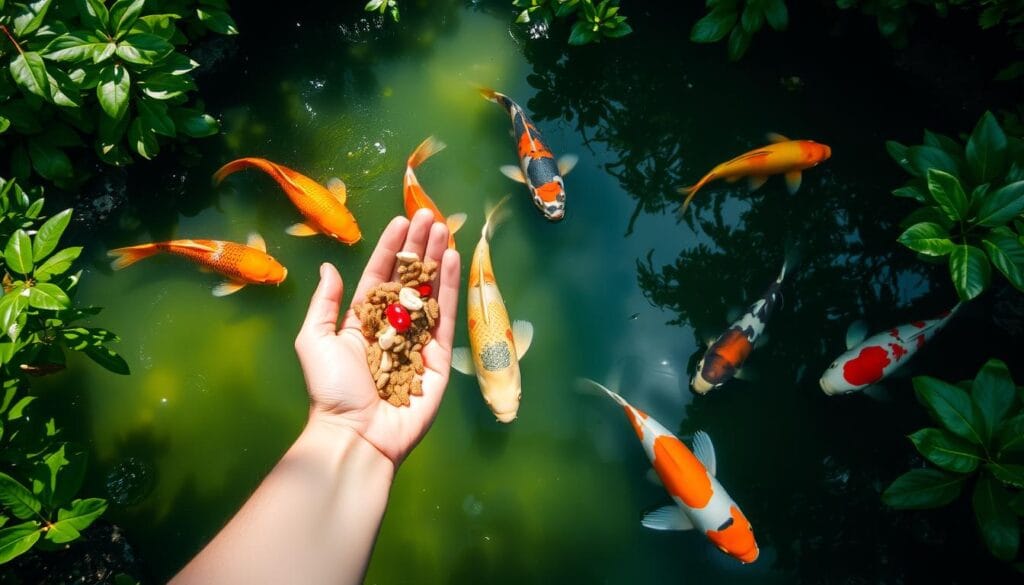
Koi need Vitamin C for their immune system and Vitamin D for strong bones. Calcium is key for bone growth. They also need some carbs but too much can upset their stomachs. In warm months, they need more protein because they metabolize faster.
To keep their diet balanced, consider the following:
- Feed a mix of commercial pellets, live or frozen foods, and fruits and veggies.
- Adjust how often you feed them based on the water temperature.
- Watch their health and change their diet if needed.
Commercial Koi Food Options
Feeding our koi fish the right food is key to their health. Commercial koi food comes in pellets, flakes, and sticks. It’s important to know about these options to choose the best for your koi.
Koi fish food offers a balanced diet with protein, fat, and fiber. Pellets are easy to digest and balanced. Flakes are good for koi that like to eat at the surface. Some foods have spirulina to improve koi color, like red.
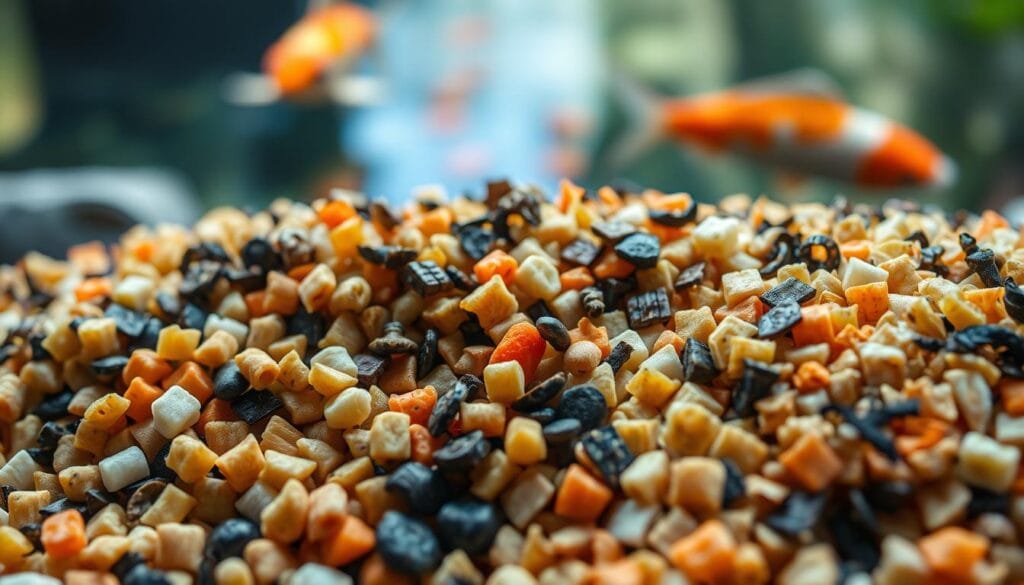
Choosing the right koi food is critical. Growing koi need 32-38% protein, while mature koi need 28-32%. Fat content varies, but it’s usually 3-10%. A high-quality food meets these needs, keeping your koi healthy.
Brands like Kodama Koi Food offer various options. Their foods are balanced and have nutrients for growth and color. Researching and reading reviews can help you find the best food for your koi.
Natural Foods for Koi Fish
Koi fish eat many organic things in the wild. Knowing what they eat helps us feed them better. This makes their diet more balanced.
In the wild, koi fish eat plants, algae, insects, and small animals. They also eat seeds and worms. Adding these foods to their commercial diet makes their meals more varied and healthy.
Aquatic Plants and Algae
Koi fish enjoy eating plants like duckweed and water lilies, and algae. These plants give them important nutrients and fiber.
Insects and Small Creatures
Koi fish also munch on insects like mosquitoes and snails, and small animals like worms. These foods give them protein and other key nutrients.
Naturally Occurring Nutrients
Koi fish can also get minerals and vitamins from their environment. These are vital for their health and happiness.
Learning about their natural diet helps us feed our koi better. This keeps them healthy and happy in their home.
Seasonal Feeding Guidelines for Koi
When we talk about feeding koi fish, we must think about the seasons. Each season affects how much food our koi need. In winter, they eat less because they’re slower. But in summer, they need more to grow and stay active.
How often and how long we feed our koi is key. The right time to feed depends on the water temperature. At cooler temperatures, feed once a week. At warmer temperatures, feed more often, up to five times a day. Short feeding sessions, about 5-10 minutes, are best. This way, our koi stay healthy and happy all year.
Here are some important tips for feeding koi fish in different seasons:
- At water temperatures between 50-55°F, feed 2-3 times weekly
- At water temperatures between 55-59°F, feed 4-5 times weekly
- At water temperatures between 60-65°F, feed 1 time daily
- At water temperatures between 65-72°F, feed 1-2 times daily
- At water temperatures between 72-90°F, feed 3 times daily
By following these seasonal feeding guidelines, we can give our koi the best care. Always put their health first when feeding koi fish. Adjust their food schedule as needed.
How Often to Feed Koi Fish
Feeding koi fish the right amount at the right time is key for their health. We must find the perfect feeding schedule for them to flourish. The amount and frequency of food depend on the fish’s age, size, and water temperature.
Feeding koi fish 2-3 times a day for 5-10 minutes is a good starting point. But, this can change with water temperature. For example, in temperatures between 64 and 88 degrees Fahrenheit, they can eat 2 to 4 times a day.
- Feed koi fish once a day when the water is between 48 and 63 degrees Fahrenheit.
- Feed them 2 to 4 times a day when the water is between 64 and 88 degrees Fahrenheit.
- Reduce feeding to prevent stress due to low oxygen levels when the water is above 88 degrees Fahrenheit.
Remember, overfeeding can harm them by causing toxic buildup. It’s vital to watch how much food you give and adjust the feeding schedule as needed. By following these guidelines, we can ensure our koi fish live a healthy and joyful life.
Foods to Avoid Feeding Koi Fish
When caring for koi fish, it’s key to know what not to feed them. Koi fish eat both plants and animals. But, some foods can harm them. Foods like peas, corn, and white bread are hard to digest and can be risky.
It’s important to give koi fish treats in small amounts. This helps avoid overfeeding and health problems. So, do koi fish eat bread? No, bread is not good for them. It doesn’t give them much nutrition and can upset their stomachs. Instead, try giving them fruits like orange slices, grapes, and watermelon. These can help reduce stress and boost their immune system.
Here are some foods to avoid feeding koi fish:
- Foods high in carbohydrates, such as peas, corn, and white bread
- Processed foods like cereal and flavored potato chips
- Spicy foods that can irritate koi and affect the pH of pond water
- Wild fish that can pose risks of parasites and diseases
To keep our koi fish healthy, we should avoid these foods and give them a balanced diet. It’s vital to feed them foods that are easy to digest and full of nutrients. As we learn more about koi fish care, we’ll talk about the importance of a balanced diet and how to create a great home for our koi fish.
Supplemental Feeding Options for Koi
We know how vital a good diet is for koi fish. Commercial koi food is key, but adding supplements can boost their health and look. Vitamins and minerals keep their immune system strong and help them grow well.
Color-enhancing foods make our koi’s colors pop. These foods have carotenoids, found in plants and animals. Growth-promoting supplements also help young koi grow fast.
Choosing the right supplements is important. Look for high-quality products made just for koi. Reputable brands offer a variety of supplements for our pets. Adding these to their diet ensures they stay happy and healthy.
Vitamin C and spirulina are great for koi. Vitamin C boosts their immune system, and spirulina makes their colors brighter. A balanced diet with these supplements helps our koi thrive and stay beautiful for years.
Common Feeding Mistakes to Avoid
Feeding koi fish can be tricky. Owners often make mistakes that harm their fish’s health. Overfeeding can mess up water quality and upset their stomachs. Underfeeding, on the other hand, can cause malnutrition and slow growth. Knowing how to feed them right is key.
Common feeding mistakes often come from not knowing what koi fish need. They should eat 2-4 times a day, depending on the water’s temperature. Young koi need Growth Formula when it’s warm, while adults need Maintenance Formula. It’s important to stop feeding when they can’t eat more in 5 minutes.
Here are some tips to avoid common feeding mistakes:
- Feed koi fish in moderation, taking into account water temperature and their age.
- Avoid feeding koi fish cheap food, as it may lead to poor health and water quality.
- Provide a varied diet that includes staple foods and occasional treats.
- Store food in air and light-tight containers to maintain freshness and potency.
By following these tips and being mindful of feeding koi fish best practices, owners can help ensure their pets stay healthy and thrive. Remember, proper nutrition significantly impacts koi health, stressing the need for quality food that reduces waste.
Special Dietary Considerations for Young Koi
When it comes to feeding our koi fish, we must remember that young koi fish food needs differ from adult koi. Young koi, like fry and juveniles, need special dietary considerations to grow well.
Web sources tell us that young koi need a diet full of nutrients. This diet should be high in protein and fat for fry. For juvenile koi, it should be balanced with protein, carbs, and fiber.
Some important things to consider for young koi food are:
- High-protein diets for optimal growth and reproductive health
- Balance of protein, carbohydrates, and fiber for juvenile koi
- Avoiding foods that can cause health issues, such as cereals, bread, and certain fruits
By giving our young koi the right special dietary considerations, we help them grow and thrive. This way, we can enjoy their beauty and company for many years.
Monitoring Koi Health Through Diet
Exploring koi care shows us how vital monitoring koi health is. A balanced diet and nutrition plan keeps them healthy. Watching their appetite, growth, and color helps spot diet-related health issues.
Signs of nutritional problems include a lack of appetite or slow growth. But, vibrant colors and active behavior show a good diet and nutrition plan.
Important factors for monitoring koi health through diet and nutrition include:
- Feeding frequency and quantity
- Water temperature and quality
- Protein and nutrient content in koi food
- Supplementary treats and snacks
Being aware of these factors helps prevent health problems. Regular monitoring of koi health through diet and nutrition is key to a healthy koi population.
Conclusion: Creating the Perfect Feeding Program for Your Koi
Understanding what your koi fish eat is key to their health. By knowing their what do koi fish eat and koi fish care needs, we can feed them right. This supports their growth, color, and overall health.
Choosing the right food and adding natural supplements is important. We need to match their diet to their age, size, and the season. Watching how much they eat helps us give them the right amount of nutrients.
Good koi fish care means a happy and healthy koi. With the right food, your koi pond will be full of life. It will bring joy for many years.
FAQ
What do koi fish eat in the wild?
In the wild, koi fish eat many things. They munch on aquatic plants, algae, insects, and small creatures.
Can koi fish eat human food?
Yes, koi fish can eat some human foods. But, it’s key to feed them in small amounts. Avoid foods high in carbs, fats, and dairy.
What are the essential nutrients for koi fish?
Koi fish need a balanced diet. This includes protein, carbs, fiber, vitamins, and minerals. These nutrients help them stay healthy and grow.
How often should I feed my koi fish?
Feed your koi fish 2-3 times a day. Each meal should last 5-10 minutes. The amount depends on their size and age.
Can koi fish eat bread?
No, bread is bad for koi fish. It can upset their stomachs and doesn’t give them much nutrition.
What are some common feeding mistakes to avoid with koi fish?
Avoid overfeeding and underfeeding your koi. Also, don’t feed them the wrong foods. These mistakes can harm their health and the water quality.
How do I adjust my koi’s diet for different seasons?
Koi fish need different foods in different seasons. Adjust their diet and feeding schedule to match the water temperature and season.
What are some good supplemental feeding options for koi fish?
Vitamins, minerals, and color-enhancing foods are great for koi fish. They help keep them healthy and vibrant.
How do I ensure my young koi fish have a balanced diet?
Young koi need a special diet. Choose foods made for fry and juvenile koi. They need lots of nutrients for growth.
How can I monitor my koi’s health through their diet?
Watch your koi’s appetite, growth, and color. This helps you spot any diet problems. Then, you can adjust their food to keep them healthy.
There are no reviews yet. Be the first one to write one.

